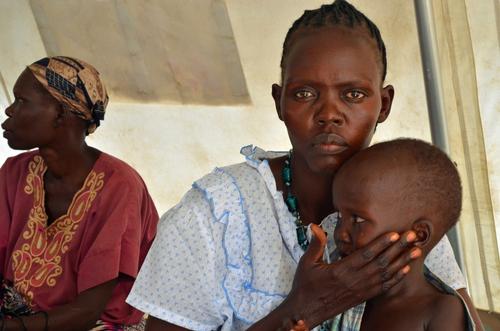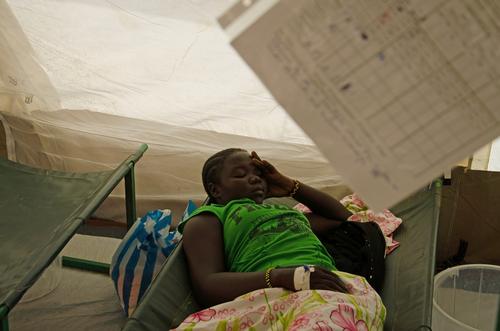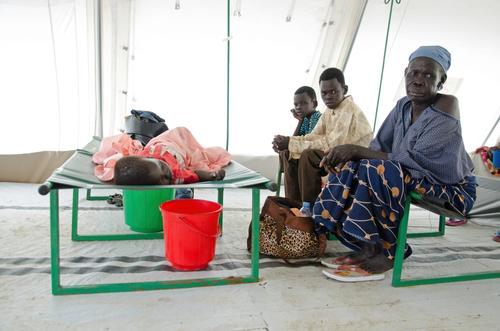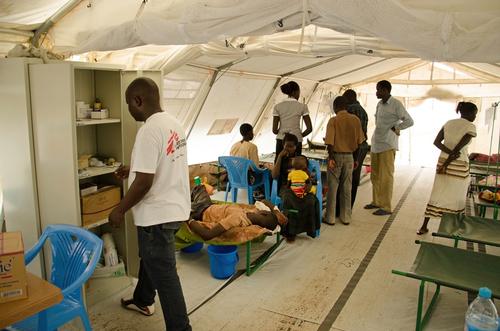Due to a recent outbreak of cholera in Juba, South Sudan, Médecins Sans Frontières (MSF) has been constructing cholera treatment centres (CTCs) around the city to provide emergency treatment for the disease.
CTC Gudele 2 is a facility made up of a hospital, recovery area, decontamination points, a laundry service to decontaminate clothes and sanitation facilities. We spoke to some of the patients and staff to find out how the outbreak had affected them.

Kiden Margaret, patient
"Cholera is now increasingly affecting many people and killing children especially. When my child started vomiting and had diarrhoea, I suspected it to be cholera. So I had to inform my husband immediately to rush us to the nearest cholera hospital in Gudele, run by MSF. When I arrived this morning, we were directed to the observation room to register. My son was very weak, now we are here and he is put on drip and given oral rehydration solutions. I hope my son will get better. It is the first time my child is being affected and treated for cholera, my other three children are all fine. At home we eat normal food and drink usual water; I do not understand how my child got the cholera.
My message to the people is that parents should take care of their children: don’t allow them to eat cold food or drink cold drinks, and keep the compound clean to avoid flies."

Alice John, patient
"When I started experiencing the signs of vomiting with slight diarrhoea, I developed fear in me, that I might die of cholera because I had no money for treatment. Fortunately, I am happy that MSF is providing us with cholera treatment. When my family told me about this Gudele 2 centre that no money had to be paid for treatment, I came straight away and now I am here being treated freely. I am happy the vomiting has reduced and diarrhoea has stopped, I am getting well. I would like to say to everyone: you should keep good hygiene!"

Unice Keji, patients' grandmother
"All my grandchildren fell sick, I did not know about Cholera sickness or symptoms; I thought this was a normal sickness or change of weather since they just came from Khartoum. When I explained my children’s sickness to my nearest neighbour and she suggested that this could be a possible sign of Cholera, she directed me to come to this Gudele 2 CTC. That is why I am here for two days now and there is great change in the two older children as you can witness. The vomiting and the diarrhoea has reduced. Only my youngest grandchild, Alfred, is still very weak but I hope the nurses will treat him to be well.
I did not give any bad food to my grandchildren. We drink borehole water which is not dirty. Possibly, the cholera was caused by the lack of proper toilets and the poor disposal of rubbish which the children ended up playing with. Children also do not wash their hands after visiting the toilets - that could be the assumed causes of the cholera.
People should take care of themselves especially children from touching dirty materials; all should keep their homes’ clean and boil drinking water."

Mududuzi Chandawila, head nurse at the Gudele 2 CTC in Juba
"As head nurse, I guide the work of the national staff and monitor the patients to see that they are given the ORS and drip to the patients at the right time. We also ensure that all patients are under our control and that all necessary needs to both the patients and caretakers are provided, including good hygiene.
As one of the guiding rules and regulations for any cholera treatment centre, no food from outside the CTC is allowed to the patients. MSF provides food, both lunch and dinner, to all patients and their carers. This is for the purposes of avoiding further cholera infections and to control the disease.
The number of patients is yet unpredictable for either increase or reduction. ‘’From the beginning of the outbreak, the suspected cholera patients were increasing by at least three to five cases per day but in the third week of the outbreak this is no longer the case. It seems the cases are reducing."


